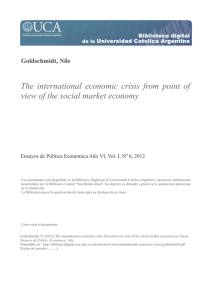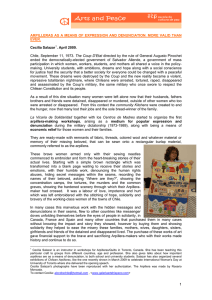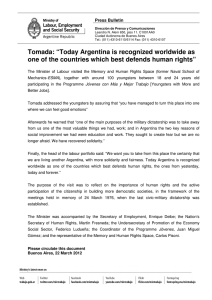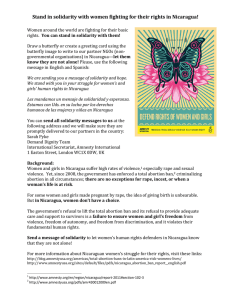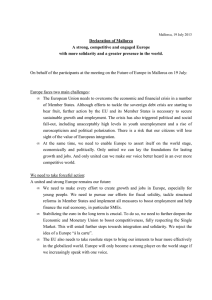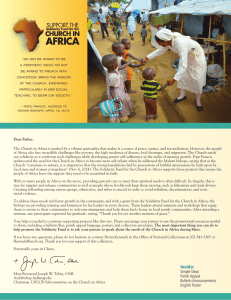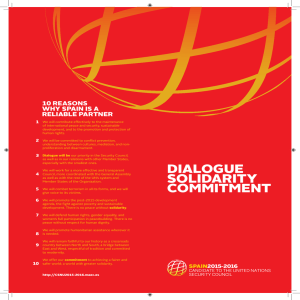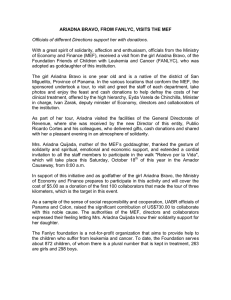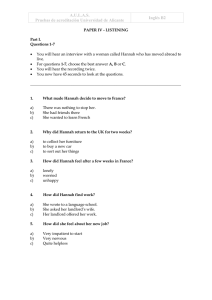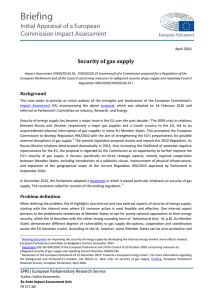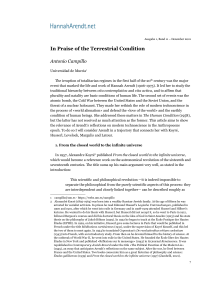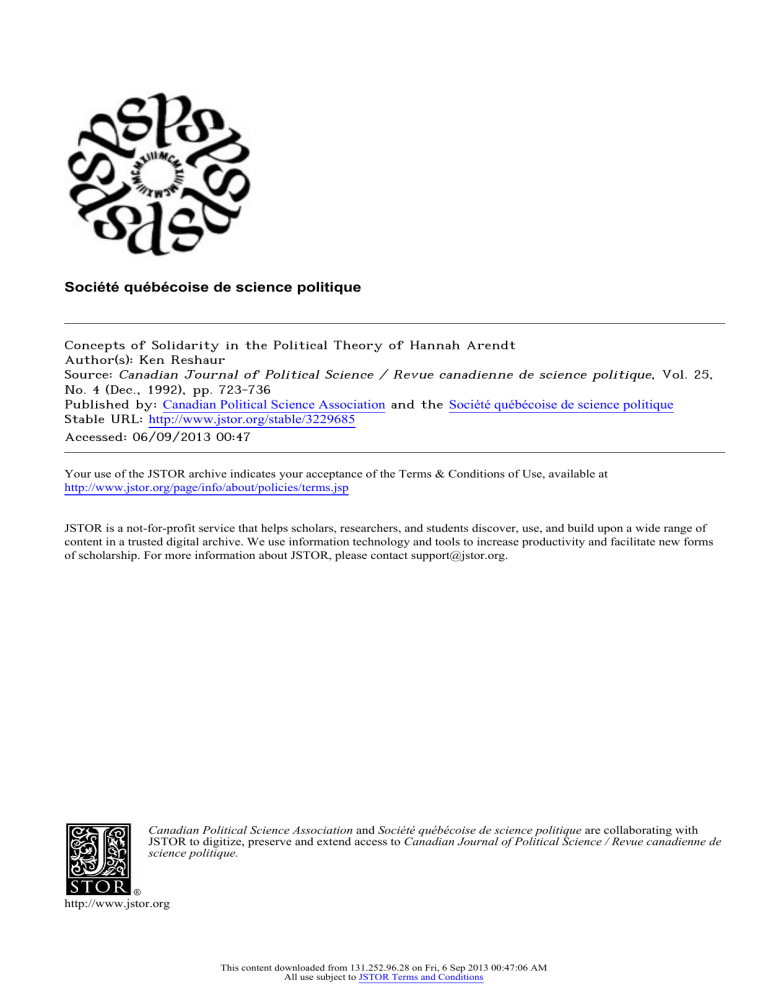
Société québécoise de science politique Concepts of Solidarity in the Political Theory of Hannah Arendt Author(s): Ken Reshaur Source: Canadian Journal of Political Science / Revue canadienne de science politique, Vol. 25, No. 4 (Dec., 1992), pp. 723-736 Published by: Canadian Political Science Association and the Société québécoise de science politique Stable URL: http://www.jstor.org/stable/3229685 . Accessed: 06/09/2013 00:47 Your use of the JSTOR archive indicates your acceptance of the Terms & Conditions of Use, available at . http://www.jstor.org/page/info/about/policies/terms.jsp . JSTOR is a not-for-profit service that helps scholars, researchers, and students discover, use, and build upon a wide range of content in a trusted digital archive. We use information technology and tools to increase productivity and facilitate new forms of scholarship. For more information about JSTOR, please contact support@jstor.org. . Canadian Political Science Association and Société québécoise de science politique are collaborating with JSTOR to digitize, preserve and extend access to Canadian Journal of Political Science / Revue canadienne de science politique. http://www.jstor.org This content downloaded from 131.252.96.28 on Fri, 6 Sep 2013 00:47:06 AM All use subject to JSTOR Terms and Conditions Concepts of Solidarity in the Political Theory of Hannah Arendt* KEN RESHAUR University of Manitoba It has become fashionable of late to see in many different kinds of joint endeavour instances of solidarity. Insofar as we restrict the meaning of individuals, solidarity to interdependence and reciprocity-between groups or states-this comes as no surprise: such relationships have always existed, varying only in scope and intensity. Solidarity, however, is not merely a descriptive term; it evokes a positive appraisal. We say that we feel solidarity, that we show solidarity, and that we have a sense of solidarity. It is this combination of the prescriptive with the descriptive which gives rise to a nagging doubt: has the concept of solidarity become so eclectic and elastic that it can accommodate the rhetoric of any person or group? Hannah Arendt, an exceptionally perceptive analyst of things political, is constantly alert to the subversion of principle that can be caused by appeals to passion and sentiment. In her work we find concepts of solidarity which, with one exception, are able to reconcile the claims of emotional force and intellectual coherence. She takes into account the concerns of the oppressed without compromising her commitment to abstract intellectual values and ideas. This determination to keep distinct the contributions of emotion and cognition results in an impressive-though largely implicit-account of four ways in which solidarity may be conceptualized. In a seldom cited commentary, Arendt considers whether it makes sense to say that one can experience feelings vicariously. She concludes that it is impossible, except in a metaphorical sense which, taken liter* I would like to thank Shiraz Dossa, from whom I borrowed the exclusive-inclusive terminology, Phil Hansen and Paul Vogt for their comments on an earlier version of this essay. I gratefully acknowledge the suggestions of the anonymous JOURNAL referees. Financial support from the Office of the Dean of Arts, University of Manitoba, was very helpful. Ken Reshaur, Department of Political Studies, University of Manitoba, Winnipeg, Manitoba R3T 2N2 Canadian Journal of Political Science / Revue canadienne de science politique, XXV:4 (December/ decembre 1992). Printed in Canada / Imprime au Canada This content downloaded from 131.252.96.28 on Fri, 6 Sep 2013 00:47:06 AM All use subject to JSTOR Terms and Conditions 724 KEN RESHAUR ally, develops into "a phony sentimentality in which all real issues are obscured."1 Moreover, she claims that solidarity is a necessary condition for emotions such as compassion in the face of suffering, the proviso being that one remain aware that it is someone else who suffers. It is instructive, therefore, to consider what she says in On Revolution. There are two passages in this study which together contain virtually all of her analytical comments on solidarity and in which is to be found, again, a sharp demarcation between the affective and the cognitive capacities of humankind. In the first passage she claims that the alternative to pity-conceived here as the perversion of compassion-is solidarity. It is throughsolidaritythatpeople establishdeliberatelyand, as it were, dispassionatelya communityof interestwith the oppressedand exploited. The commoninterestwouldthen be "the grandeurof man"or "the honourof the human race" or the dignityof man. For solidarity,because it partakesof reason, and hence of generality,is ableto comprehenda multitudeconceptually,not only the multitudeof a class or a nationor a people, but eventuallyall mankind.But this solidarity,though it may be aroused by suffering, is not guided by it, and it comprehendsthe strong and the rich no less than the weak and the poor; comparedwith the sentimentof pity, it may appearcold and abstract, for it remainscommittedto "ideas"-to greatness,or honour,or dignity-rather than to any "love" of men.... Terminologicallyspeaking, solidarityis a principle that can inspire and guide action.2 In the second passage Arendt writes: "The political trouble which misery of the people holds in store is that manyness can in fact assume the guise of oneness, that suffering indeed breeds moods and emotions and attitudes that resemble solidarity to the point of confusion."3 What Arendt wants to make clear when she writes about solidarity is how essential it is to the integrity of this principle for there to be a world which mediates the concern of one with the suffering of another. If solidarity is a precondition for the existence of compassion, it is because solidarity is world-building. It provides a means by which a relationship can be established between people who suffer and people who decide to remove or at least ameliorate this suffering, by establishing a community of interest with the oppressed. The world, by relating at the cost of separating, is what enables concern and compassion rather than pity to be the feeling one experiences as a solidary. This distinction between self and world is at the centre of Arendt's thought. Arendt's writings contain four concepts of solidarity.4 One is a solidarity which has its basis in the experience of a coincidence of I Hannah Arendt, "Collective Responsibility," in James W. Bernauer, ed., Amor Mundi: Explorations in the Faith and Thought of Hannah Arendt (Boston: Martinus Nijhoff, 1987), 43. 2 Hannah Arendt, On Revolution (New York: Viking, 1963), 84. 3 Ibid., 90. 4 The history of solidarity involves two Latin derivatives: salvus, which means safe; This content downloaded from 131.252.96.28 on Fri, 6 Sep 2013 00:47:06 AM All use subject to JSTOR Terms and Conditions Abstract. This article has two objectives: one is to distinguish and explicate four concepts of solidarity which are found in the writings of Hannah Arendt; the other is to show how Arendt's respect for facts and suspicion of sentiment publicly displayed are justified. The first concept of solidarity is exclusive solidarity. It is limited to those who are suffering from exploitation or oppression. The second conception of solidarity is inclusive: it includes those who suffer but can also accommodate those who make common cause with them. This is the only kind of solidarity that Arendt specifically analyzes. A third concept of solidarity is universal: its proximate constituent parts are the different "peoples" who collectively make up humankind. Finally, there is natural solidarity. This variety of solidarity, the author argues, is conceptually inadequate and confused. In the development and articulation of each of these four concepts, some attention is given to the relative contributions of emotion and cognition in determining one's understanding of solidarity. Resume. Le present article vise deux buts: le premier est de distinguer et d'expliquer quatre concepts de la solidarit6 qui se trouvent mentionn6s dans les 6crits de Hannah Arendt, alors que le deuxieme est d'illustrer comment le respect que d6montre Arendt pour les faits, tout comme sa m6fiance h l'6gard de la manifestation publique des sentiments, sontjustifies. Le premier concept de la solidarit6 est la solidarit6 exclusive: celle-ci est limit6e aux victimes d'exploitation ou d'oppression. Le deuxieme concept est la solidarit6 inclusive: celle-ci englobe non seulement les victimes, mais aussi ceux et celles qui font cause commune avec elles. Il s'agit ici du seul concept de la solidarit6 qu'elabore Arendt de fagon precise. Le troisieme concept est la solidarit6 universelle: ses composantes imm6diates sont les divers peuples qui constituent ensemble l'humanit6. Le quatrieme concept est la solidarit6 naturelle. L'auteur soutient que cette dernitre cat6gorie de la solidarit6 est non seulement vague, mais aussi insuffisante du point de vue conceptuel. En d6veloppant et en expliquant ces quatre concepts, les roles relatifs que jouent les sentiments et la cognition dans l'l6aboration de la comprehension de la solidarit6 sont consideres aussi. aspirations and interests (a community of interest). This coincidence is an objective phenomenon of which individuals become aware when their status, normal expectations or way of life are compromised, threatened or thrown into bold relief by their perception that it is alterable for the better. What they share is a commonness of situation or circumstance; their solidarity consists in the generation and pursuit of a common response designed to remove or ameliorate the conditions which place them at risk. Their aim is to achieve justice and be accorded respect. I shall call this "exclusive solidarity" since it is an act of self-help, restricted to those who suffer in the same objective fashion. A second kind of solidarity is inclusive: it comprehends those who suffer and those who seek to make common cause with them even though they do not find themselves in the same objective, factual circumstances. A third variety of solidarity is universal solidarity: it is a fundamental and unavoidable articulation of the plurality of peoples distinctive of humankind. This type is sometimes described by Arendt as pre-political since it has to do with the "givenness" of identity in a national sense.5 However, 5 and sollus, which means entire. The term was used in ancient Rome to refer to the practice, among the Roman gens, of co-proprietorship and collective financial responsibility. Subsequent French usage emphasized the notion of a perfect union, or a community of perfect coincidence, in terms of aspirations, sympathies and interests. Hannah Arendt, The Jew as Pariah, ed. by Ron Feldman (New York: Grove Press, 1978), 246. This content downloaded from 131.252.96.28 on Fri, 6 Sep 2013 00:47:06 AM All use subject to JSTOR Terms and Conditions 726 KEN RESHAUR I view it as clearlypoliticalsince nationalidentityusuallyhas politicalas well as culturalsignificance.A fourthtype of solidarityis based on one's "own kind"-what I shall call naturalsolidarity. Solidarityis of minorimportancein Arendt'sthoughtso long as we continue to construe her concept of political action solely in agonistic terms. Recent scholarship,however, has shownthatHannahArendthas at least two conceptions of political action which appearto be in tension.6The first, which permeatesthe argumentof The Human Condition, exults in agonistic encountersbetween citizens. Her exemplarof this is the Greekpolis of antiquity.A second perspective,derivedfor the most part from On Revolution and Crises of the Republic, emphasizes the republicanaccent in Arendt's work and points out the importance for her politicaltheory of active, participatorycitizenship. This emphasis, buttressedby the fact thatreferencesto solidarityarefoundthroughout herwritings,shows that solidarityis a considerationof some significance in her political thought. 1 Exclusive solidarity,anchoredin oppression,may be precipitatedby an intensification of tyranny which results in the citizen realizing how inuredto sufferinghe has become. It may result from the efforts of a charismaticpersonality to draw to the attention of the oppressed the injustice of their plight. Or it may be the unanticipatedoutcome of an isolated act. The dynamics of this kind of experience appearto be as follows. The oppressedpersonputs up with the circumstancesin which he finds himself. He is alienatedfromthe sense of himselfas an initiator of change. His awarenessof oppressionis not discrete but holistic; he has become so habituatedto assimilatinghis tacit awarenessof self to his oppressed self that, practicallyspeaking,he is unableto use awareness of the daily, routinizedoppressionbuilt into his life as a cognitivelever by means of which he can acquirea disengagedperspective. Shouldan opportunityfor change presentitself, however, such a person may very well become aware of the fetters of his situationand, with them as the focus of his attention, attempt to remove them, replacing them with conditions more likely to allow him to feel at home in the world. This, I believe, is an account of the development of exclusive solidaritywhich is both plausible and implicit in Arendt's account of how the councilformof governmentappearedduringthe shortlife of the HungarianRevolutionin 1956.The councils, as had the Pariscommune 6 See, for example, Maurizio Passerin d'Entreves, "Agency, Identity, and Culture: Hannah Arendt's Conception of Citizenship," Praxis International 9 (1989), 2-24; Jennifer Ring, "The Pariah as Hero: Hannah Arendt's Political Actor," Political Theory 19 (1991), 433-52; and Seyla Benhabib, "Judgment and the Moral Foundations of Politics in Arendt's Thought," Political Theory 16 (1988), 29-51. This content downloaded from 131.252.96.28 on Fri, 6 Sep 2013 00:47:06 AM All use subject to JSTOR Terms and Conditions Solidarity in the Political Theory of Hannah Arendt 727 before them, provided a space of appearance for action and the generation of power. There was a wide variety of bases for the councils that sprang up; and they began to generate organizational ties, both horizontal and vertical, building on networks of relationships between people which, for the most part, constituted the practical ambience of their lives. There were neighbourhoodcouncils that emergedin all residentialdistricts, so-calledrevolutionarycouncils that grew out of fightingtogetherin the streets, councils of writersandartists,bornin the coffee houses of Budapest,students'and youth's councils at the universities,workers'councils in the factories, councils in the army,among the civil servants and so on.7 The councils were spaces for action where words did not conform to the logic of an ideology or the constraints of party discipline. They incorporated the federalist principle, and because of their bottom-up representational structure, their articulation at the base retained its integrity.8 Arendt's commentary on the council phenomenon includes mention of two considerations of central importance to an adequate explication of exclusive solidarity: equality and authority. People in a relationship of solidarity are, for the purposes of that relationship, equal, since solidary action is concerted action and requires comparable, although not identical, effort. Authority is similarly dispersed among the constituent actors in such a relationship since each person understands the rationale of solidary action in terms of his own reading of a situation common to all. This enables him to exercise the power which flows from mutual dependence: an ongoing negotiation and renegotiation of the terms, direction and goals of the solidarity grouping. This requires substantial overlap of tacit awareness by each actor of the shared context so that a coherent outcome is the result. The structure of inclusive solidarity differs from exclusive solidarity inasmuch as the experience of oppression is an experience available only to the oppressed; it cannot be shared with those who choose deliberately to establish a community of interest with them. By contrast, the particulars of the situation which are sources of irritation, harrassment, pain and alienation which the oppressed have become used to may be blatantly obvious to those who make common cause with them. This is the point and substance of Arendt's claim that solidarity may be aroused by suffering but is established dispassionately. It is, indeed, impossible to have vicarious feelings, but it is not at all difficult to make the judgment that certain factual conditions involved in the objective situation of another person or group constitute an affront to the dignity of humankind. The reaction of prospective solidaries, upon becoming aware of subhuman conditions with which other people have to contend, may 7 Arendt, On Revolution, 270. 8 Ibid., 282. This content downloaded from 131.252.96.28 on Fri, 6 Sep 2013 00:47:06 AM All use subject to JSTOR Terms and Conditions 728 KEN RESHAUR quite predictably be outrage. This emotion, however, comes after the facts are known; it is completely contingent except as a motivating factor for solidary action. The failure to distinguish between facts and feelings does, as Arendt claims, account for the proclivity of some people to mistake "to the point of confusion" moods and emotions for solidarity.9 I want now to focus on an instance of inclusive solidarity mentioned by Arendt; it occurred during the Nazi occupation of Denmark, when the Germans demanded the right to deport stateless people. The majority of persons in this category were German Jewish refugees who had been deprived of their nationality and whom Denmark, in common with other states, had refused to naturalize or grant permission to work. However, while Denmark did not welcome the refugees, "the right to asylum, nowhere else respected, apparently was considered sacrosanct."10 This stand on a matter of principle was not compromised; the German officials were told that because the denationalized refugees were no longer German citizens the Nazis could not deport them without Denmark's consent. This, in Arendt's view, was an act of considerable political courage reinforced by a display of solidarity when the King of Denmark and the entire population chose publicly to wear the same Star of David that German occupying forces compelled the Jewish refugees to wear. The Star of David stands for the Jews as a distinct people. Without intrinsic interest in itself, this symbol has significance to the extent that what it means to be a Jew becomes embodied in it. We can better understand the dynamic structure of this meaning if we use Michael Polanyi's distinction between subsidiary and focal awareness as it bears on and enables us to distinguish between self-centred and self-giving integrations.11 Tacit knowing is what Polanyi calls "knowing more than we can tell." What this means is that to the extent that we exercise a skillphysical or cognitive-we focus on it, having integrated the various particulars of which it is composed. For example, the accomplished Fraternity, for example, involves a bond valued for its own sake: it is a union of sentiment. Solidarity equalizes people in the special condition that Arendt calls "worldliness."' Fraternity does not require those caught in its bond to regard others so circumstanced as equals in any publicly significant respect. Fraternity is primarily a psychological phenomenon since it is not worldly but "has its natural place among the repressed and persecuted, the exploited and humiliated." But above all fraternity, especially when found among pariah people, may entail a worldlessness which is so extreme as to be a form of barbarism. For a more systematic treatment of fraternity see Andreas Eshete, "Fraternity," Review of Metaphysics 35 (1981), 27-44. 10 Hannah Arendt, "Sonning Prize Speech," The Papers of Hannah Arendt, Library of Congress, Washington, D.C., container 77. 11 Michael Polanyi, "Lecture on Meaning," The Papers of Michael Polanyi, The University of Chicago, Box 41, Folder 2. 9 This content downloaded from 131.252.96.28 on Fri, 6 Sep 2013 00:47:06 AM All use subject to JSTOR Terms and Conditions Solidarity in the Political Theory of Hannah Arendt 729 pianist is not aware of the discrete movements of his fingers on the keyboard nor the notes of which he takes notice as he plays. If he made these things the focus of his attention, he would be unable to play; he would be back at the stage he was when he was learning to read music and familiarizing himself with the keyboard. The accomplished player cannot afford to make the centre of his attention those particular movements which collectively enable him to execute a sophisticated, holistic act. He can only be tacitly aware of them; they are subsidiary to the whole. He has integrated these particulars jointly to constitute a whole of which he is aware in a focal or direct sense. Thus, in a self-centred integration of the subsidiary particulars or clues to a focal whole, the focus is of intrinsic interest, while the subsidiaries have no significance in themselves. However, in a self-giving integration we surrender to something, such as a flag or the Star of David, which is of no intrinsic interest.12 We already have a range of meaningful experience which we seek to embody in the object which, in itself, is meaningless. Therefore, when the King of Denmark chose to wear the Star of David and was accompanied in this act by the population at large, they were giving a meaning to this symbol which, in at least one respect, overlapped that of the Jews. This respect was that being a Jew meant that you were expendable and, since the Jews were stateless, of no worldly significance. By wearing the Star of David, the Danes were telling the Germans that the occupying authorities would have to consider them to be expendable as well. Denmark's claim that the Jews were covered by the right to asylum was reasserted; the worldly status of the Jews was affirmed; and the Germans were reminded of the worldly status of the Danes. This way of "answering back" established solidarity with the oppressed Jews on a moral and legal, not a sentimental basis. 2 Arendt's conception of universal solidarity has its origin in her distinction between nature and humanity: human beings are very unnatural beings and cannot be fully understood in terms of the categories of nature which we apply to animals. Humanity exists only to the extent that humans are able to transcend their natural needs and attributes. This conception of humankind articulates with two of Arendt's most important concepts: natality-the possibility of the new and unexpected which each new birth brings to the world; and plurality-the fact that while there are many people in the world, each one is distinctive. Both of these attributes require the freedom of a world for their activation and realization. To forsake the world and become preoccupied with con12 Michael Polanyi, "Of Self-Giving," The Papers of Michael Polanyi, The University of Chicago, Box 41, Folder 11. This content downloaded from 131.252.96.28 on Fri, 6 Sep 2013 00:47:06 AM All use subject to JSTOR Terms and Conditions 730 KEN RESHAUR cerns of the self negates the possibility of human solidarity.Arendt's account of how this has taken place in our time constitutes one of the most harrowingand pessimistic chapters of her political thought. Although Arendt's evocation of the Greek polis and the era of foundationin the United States gives us an inspiringversion of political action, it is the respects in which recent events mark a decline of solidaritywhich are more revealing, since Arendt acknowledges that universalsolidaritymay be more appropriatelyconceived as a lack, as a "negativephenomenon."'3AccordinglyI shall begin my explicationof this kind of solidarityby consideringthe meaningof Arendt's sense of shame. "I am ashamedof beinghuman.This elementalshame, which many people of the most variousnationalitiessharewith one anothertoday, is what finally is left of our sense of internationalsolidarityand it has not yet foundan adequatepoliticalexpression."l4The idea of the solidarity of humanityis somethingin which we can dwell; we can put our whole existence into it in an act of surrender,thereby endowingit with meaning. This concept in which we dwell embodies our diverse experience, integratingit and attaining a non-mechanical, non-serial coherence which is self-givingratherthan self-centred.15 This momentof recognition, in which we "see" ourselves in others and thereby confirm our membershipin the samespecies while simultaneouslyretainingourown perspective deriving from our unique space in the world, gives us a generic identity. So, "when people say: I cannot see myself doing somethingthey abhor,it is the givingof themselves as a whole thatthey are pondering.And they are rightwhen thinkingof it that they will have to live with the imageof themselvesin the way they have acted."16 To be repelled, and feel ashamed by what some who are similarly circumstanced have done to other persons or peoples with whom we share an identity, as well as the earth, is to be burdenedby the obligationof a general responsibilityfor the actions of one's fellow human beings. More specifically, the political significance of the idea of universal solidarityis that it is "the only guaranteethat one superiorrace"'7will not be successful in dominatinghumankind.Eichmann, by actively supporting and implementing a policy of Jewish extermination, breacheduniversalsolidarity.Therefore,the rest of the humanrace no longercan be expected to sharetheircommonhabitat-the earth-with him.18 The example of Eichmann, extreme though it may be, is not 13 Hannah Arendt, The Origins of Totalitarianism (New York: World Publishing, 1958), 315. 14 Arendt, The Jew as Pariah, 234. 15 Michael Polanyi and Harry Prosch, Meaning (Chicago: University of Chicago Press, 1975), chap. 4. 16 Polanyi, "Of Self-Giving." 17 Arendt, The Origins of Totalitarianism, 161. 18 Hannah Arendt, Eichmann in Jerusalem (New York: Viking, 1963), 255-56. This content downloaded from 131.252.96.28 on Fri, 6 Sep 2013 00:47:06 AM All use subject to JSTOR Terms and Conditions Solidarity in the Political Theory of Hannah Arendt 731 unique. Much of Arendt' s writing documents how the idea of humanity, to which we give ourselves and from which we receive confirmation of our identity, has become a notion which terrorizes, haunts, grieves and burdens us. Under such circumstances owning up to human solidarity is a negative affirmation. How did it happen that Arendt became ashamed of her human status? The immediate answer is that humankind both allowed and enabled totalitarianism to develop and exist. The more general answer, given Arendt's conceptual commitments, is that there took place an inexorable erosion of worldliness in the modern age. Not only was there a transformation of property into wealth, or a class society into a mass society, or solitude into loneliness or, finally, action into behaviour with the consequence that life, not the world, became the highest good. As well, and most ominous, people became superfluous in the context of a temporality made meaningful by theories of inexorable processes of history and nature. Arendt begins her chronicle of how these developments had a negative impact on our conception of the person by documenting the loss of the juridical person in humankind. She observes that the Declaration of the Rights of Man and the Citizen, proclaimed during the French Revolution, attempted to derive both the origin of power and the foundation of law from the same source.19 The result was the deification of the people and the rejection of a transcendent anchor for the rights of man.20But by basing putative universal rights on the particular heritage of specific nations, there arose a contradiction between the sovereignty of the state and the obligation placed upon the state to be the guarantor of rights which were universal in both scope and derivation.21 During the nineteenth and early twentieth centuries this unstable compromise at the heart of the nation-state between the state as the vehicle for the expression of the will of nationals-those citizens who had been born into the dominant grouping of people in the state-and the state as the expression of legal and political equality between different peoples regardless of their national origin and relative power position, became increasingly ineffective. This, combined with substantial erosion of the European social, economic and political infrastructure, especially the dissolution of class identification and the party system articulated with it, gave rise to what Arendt calls a "new terrifying negative solidarity.'22 Stateless people were convinced that the loss of national rights entailed the loss of human rights, so the tendency to seek identification in terms of a national, as distinct from a state, affiliation was intensified. Correspondingly, lack of success in finding a national grouping and therefore 19 20 21 22 Arendt, On Revolution, 183. Arendt, The Origins of Totalitarianism, 290-91. Ibid., 230. Ibid., 315. This content downloaded from 131.252.96.28 on Fri, 6 Sep 2013 00:47:06 AM All use subject to JSTOR Terms and Conditions 732 KEN RESHAUR the inability to claim minority status intensified the rejection of stateless status. Perhaps more decisive than anything else which occurred during this period was the loss of the right of asylum, which had existed since the beginning of Western civilization and which was "the only right that had ever figured as a symbol of the Rights of Man in the sphere of international relationships."23 This, along with the neglect of the republican understanding of communal life which holds that an infringement on the rights of one is an infringement on the rights of all24and which had long been expressed in the dictum of equality before the law, was deliberately repudiated as a consequence of the ascendance of the idea of the national over that of the citizen and, ultimately, over that of the human being. Following the loss of rights was the loss of one's home, with all its implications in terms of an assured place in the world with its associated network of relationships. However what was truly "unprecedented [was] not the loss of a home but the impossibility of finding a new one."25 Next came the loss of legal status in all countries, not just one. "The new refugees were persecuted not because of what they had done or thought, but because of what they unchangeably were."26 They did not fit into the fabric of any state because they were not a part of the dominant group in that state and were therefore excluded from the political community. Nobody even wanted to oppress them.27 Nobody was interested in their opinion; the relation between what they did and how they were treated was entirely contingent, so that their actions no longer had any intelligible significance. They had, given the fact of a completely organized humanity, lost their place in the world and with it had lost their dignity as human beings. Since respect for human dignity "implies the recognition of my fellow-men or our fellow-nations as subjects, as cobuilders of a common world,"28 loss of human dignity is "loss of the essential quality of man."29 In sum, Arendt maintains that loss of the significance of speech and action amounts to the loss of human dignity, which constitutes, in turn, the loss of a polity and the loss of humanity. The Rights of Man ended when humankind was stripped of all identifying attributes. Citizenship and dignity let both the individual and the species show through. Loss of citizenship and loss of dignity left humanity as a meaningless abstraction. The Rights of Man did not articulate with reality in such a fashion that they could bear the burden and encourage the potential of universal solidarity. Following the loss of the juridical person was the loss of the moral person in humankind. This was effected by a totalitarian regime which deprived protest of an audience and therefore of a history. When one's 23 24 25 26 Ibid., Ibid., Ibid., Ibid., 280. 106. 293. 294. 27 Ibid., 297. 28 Ibid., 458. 29 Ibid., 297. This content downloaded from 131.252.96.28 on Fri, 6 Sep 2013 00:47:06 AM All use subject to JSTOR Terms and Conditions Solidarity in the Political Theory of Hannah Arendt 733 death is made anonymous, it merely sets "a seal on the fact that he never really existed."30 This applies equally to routinized murder and individual suicide. Indeed, the latter was ambiguous morally since suicide might have the consequence that one's family would be killed. This prepared the way for the administration of the death camps to involve inmates in running the camps, thereby blurring the distinction between prisoner and persecutor. Finally, Arendt considers the loss of identity as a consequence of the loss of plurality. This occurred in the camps on an individual basis and on a world scale on the basis of race. In the camps, spontaneous violence designed to manipulate one's body in ways calculated to destroy a sense of identity at least involved "a last remnant of humanly understandable feeling."31 When this was replaced by a systematic, calculated challenge to human dignity, its results confirmed "that human beings can be transformed into specimens of the human animal, and that man's 'nature' is only 'human' insofar as it opens up to man the possibility of becoming something highly unnatural, that is, a man."32 Loss of plurality on the basis of race is, for Arendt, a political tragedy of the first order: "race is, politically speaking, not the beginning of humanity but its end."33 Consequently, she makes a distinction between races and nations or peoples. For example, the European "Pan" movements of the interwar period were, in her opinion, an instance of tribal nationalism under seige, surrounded by hostile outsiders rejecting their claims to be unique and of divine origin.34 These racists "denied the great principle upon which national organizations of peoples are built, the principle of equality and solidarity of all peoples guaranteed by the idea of mankind."35 The fact that Eichmann had, by his actions, denied this same principle, provided Arendt with the basis and rationale for her judgment on him. Arendt has quite a different conception of a people: it is a nation in which what is held in common is not the sameness of race but participation in a shared language, history and culture. In the context of a world federalism, individuals would mediate their political contribution through the nation so that there would be both a sameness and diversity. In contrast, a world government which had a direct relationship with the individual and, corresponding to this, a world citizenship would mean the end of all citizenship. It would not be the climax of world politics but quite literally its end. This would be the outcome since such a political arrangement would attempt "to overcome and eliminate authentic politics, that is, different peoples getting along with each other in the full force of their power."36 The federal principle, then, is the one organiza30 Ibid.,452. 34 Ibid.,234. 31 Ibid.,454. 35 Ibid.,161. 32 Ibid.,455. 36 Ibid.,142,n. 38. 33 Ibid.,157. This content downloaded from 131.252.96.28 on Fri, 6 Sep 2013 00:47:06 AM All use subject to JSTOR Terms and Conditions 734 KEN RESHAUR tional device that Arendtsees as capable, at some time in the future,of providingthe infrastructurefor universal solidarity. 3 Arendt mentions two instances of solidarityof one's "own kind" or what I shall call naturalsolidarity.They both illustratea type of solidarity in which what people have in common is a naturalattribute.On the otherhand,only in the case of the familyis the givennessthey exemplify that which typifies humanityin contradistinctionto, say, a particular racial group or age category. Arendt's characterizationof these as instances of solidarityis both unexpected and disappointing. The first instanceis foundin Arendt'sobservationthatthe "natural solidarityof 'white' men in alien lands"37promptedthe perversionof nationalconsciousness into race consciousness. Consistentwith this is her claim that, faced with a non-historicalcompletely naturalworld in which the restraintsand conventionsof Westernsociety neitherexisted nor applied, "the gentlemanandthe criminalfelt not only the closeness of men who share the same color of skin, but the impact of a world of infinite possibilitiesfor crimes committedin the spirit of play."38 The second instance is the family unit where she mentions that "membership in a social class replaced the protection previously offered by membershipin a family, and social solidaritybecame a very efficient substitute for the earlier, naturalsolidarityruling the family unit."39While this passage mentionedinterests-since class solidarity would seem to be about interests-Arendt specifically refers to "natural" solidarity in the family. This combination and juxtaposition of words, natural and solidarity, seems to be, in terms of the logic of Arendt'spositionas statedat the beginningof this article,inconsistentif not contradictory. Finally, in a discussion of the crisis in education, Arendtadvances an argumentagainstchild-centredliberaleducationandmakesa case for the necessity of adultauthorityin the classroom if childrenare going to be inducted properly into the world. An essential component of her critiqueinvolves the salutaryrole which solidaritycan play in the relation between the child and its peer groupon the one hand, and the child in its relationto adultauthorityon the other. She claimsthatthe fact that a child can "count on the solidarityof other children,that is, of his own kind,"40gives some base to the child from which a grievance can be mountedand an argumentmade. It is the possibility that there is some flexibilityin the relationshipwhichis the enablingconditionfor a contest 37 38 39 40 Ibid., 503. Ibid., 190. Hannah Arendt, The Human Condition (New York: Doubleday Anchor, 1959), 232. Hannah Arendt, Between Past and Future (New York: World Publishing, 1961), 181. This content downloaded from 131.252.96.28 on Fri, 6 Sep 2013 00:47:06 AM All use subject to JSTOR Terms and Conditions Solidarity in the Political Theory of Hannah Arendt 735 to take place. By contrast, there is no room to move for the child who is in a singular minority confronting the unanimous opposition of its peer group. Now, apart from the persuasiveness of Arendt's indictment of liberal education, her contention that solidarity springs from the possession of certain natural attributes ("his own kind"-is this the level to which "objective bonds" has sunk?) or is activated by a natural status, suggests that this conceptualization of "natural" solidarity is somewhat distinctive. First of all, one need not earn the status of a solidary; both the capacity and the existence of solidarity is presumed to exist by virtue of natural, defining attributes. Second, and of considerable importance, is the inescapable conclusion that solidarity, or at least this conception of it, does not require a world for its existence or recognition. In the case of children, one of the main points Arendt seeks to make is that the educational process should function in such a fashion that it is an introduction to the world for young people. But the schoolchildren who are potential or actual solidaries do not yet have a world in Arendt's sense; therefore, "natural" solidarity does not require a world-it can flow from the presence and possession of natural attributes. In other words, solidarity can exist in a natural state determined by natural processes such as equivalence of physiological maturation on the part of those among whom solidarity exists. This is entirely consistent with her claim that natural solidarity developed among white people in those colonies where the indigenous people and culture were alien, the natural attribute being something entirely contingent and fortuitous: white skin. We must, I believe, ask ourselves what was the enabling condition, in this instance and the other two, for natural solidarity to exist. The answer is straightforward: the lack of a world which enabled nature to set the agenda for those who had lost a world and embraced with enthusiasm their new-found worldlessness because of its "infinite possibilities"; those for whom the option neither occurred nor existed; and those who had not yet become worldly. Worldless people do not, it seems, choose natural solidarity: they accept it. And, in doing so, if Arendt is to be consistent, the rationale of solidarity is perverted since it is not committed to "ideas." On the basis of these examples, it seems clear that natural solidarity is a condition in which both praise and blame, responsibility and entitlement, are misplaced and irrelevant. The use by Arendt of the term solidarity in these circumstances is, as noted above, quite inconsistent with her normal usage. It is completely at odds with her indictment of racism and dismissal of the political claims of racists who imported considerations of nature into politics. It also robs of its point and impact the thrust of her distinction between human and natural behaviour.41 41 Hannah Arendt, Men in Dark Times (New York: Harcourt, Brace and World, 1968), 12. This content downloaded from 131.252.96.28 on Fri, 6 Sep 2013 00:47:06 AM All use subject to JSTOR Terms and Conditions 736 KEN RESHAUR 4 In the passage from On Revolution cited near the beginning of this article, Hannah Arendt claims that solidarityhas to do not only with lifting oppressionbut, as well, with overcomingexploitation. There is little in her writings, however, which shows concern for the "social question." This lack of consideration for socio-economic factors, except as they have a negativeimpacton politics, has been widely noted by both detractorsanddefendersof her work. Indeed, in one of the few instanceswhen she does mentionsolidarityin a socio-economiccontext, it has at least as much to do with her views on student protest movementsas withuniversityworkerswho were on strikefor higherwages.42 Arendt's intransigenceon the social question, her refusal to consider society as anythingmore than a corruptionof the private and a threatto the publicrealm,is shown clearlyin her response to the entire questionof decent housing. This, she claims, is an entirely administrative matter-to be addressedand decided by experts.43But, of course, that is not at all the case. Decent housingis closely relatedto considerationsof humandignity.And by her own admission,humandignityis an importantand legitimate goal of solidarity. Hannah Arendt, in this respect, simply refuses to consider the facts. Whenit comes to a solidaritywhich is constitutedin orderto reject tyrannyand oppression,HannahArendt'saccount of the corruptionof solidarityby pity is very perceptive as well as significant. This, combined with her critiqueof modernityto the effect that world-alienation and not self-alienationis characteristicof contemporaryWesternsociety,44remindsus of the threat to solidarityposed by the self that has ceased to be the means by which pluralityis mediated, having itself become the focus of attention.It is in such circumstances,of which our time providesabundantexamples, that Arendt's stress on revealingthe facts of oppressionis extremelyimportant.Solidarity,if it is authentic,is founded on and informedby the facts-not feelings, especially those which are thought to be vicarious. 42 43 44 Hannah Arendt, Crises of the Republic (New York: Harcourt Brace Jovanovich, 1972), 203. Melvyn Hill, Hannah Arendt: The Recovery of the Public World (New York: St. Martin's Press, 1979), 319. Arendt, The Human Condition, 231. This content downloaded from 131.252.96.28 on Fri, 6 Sep 2013 00:47:06 AM All use subject to JSTOR Terms and Conditions
